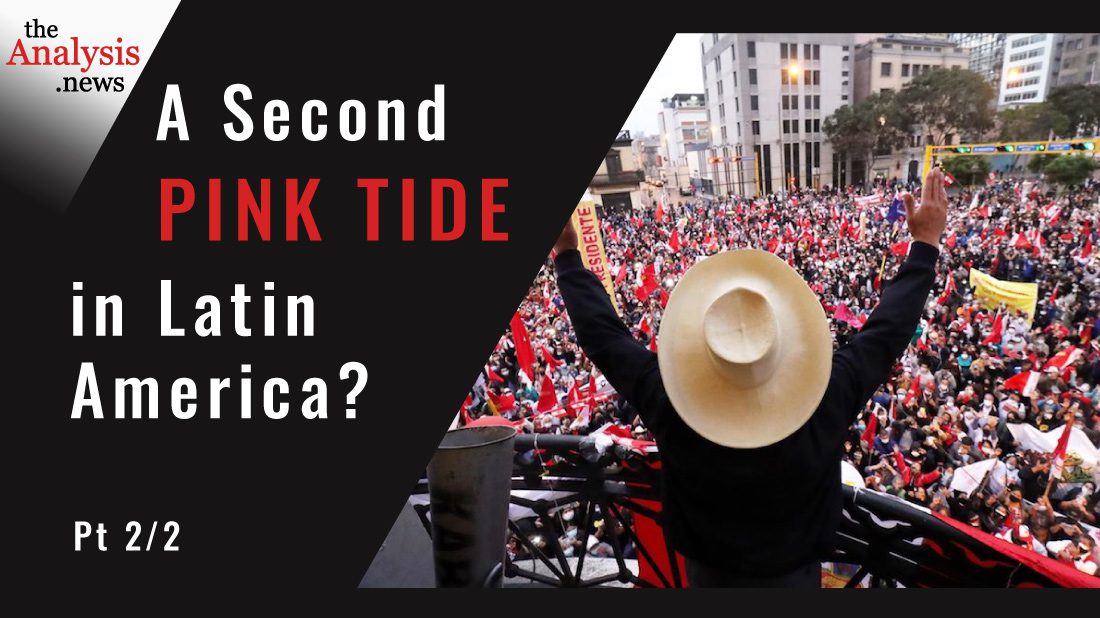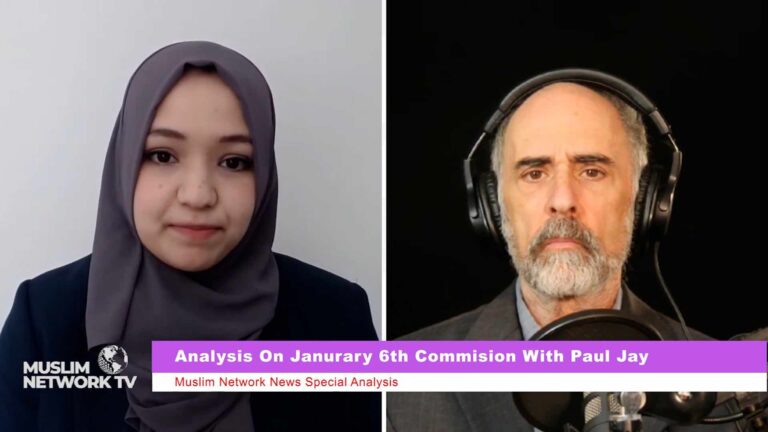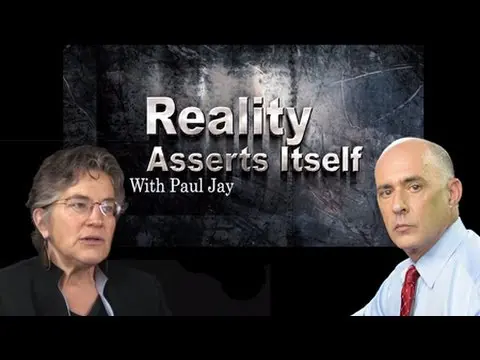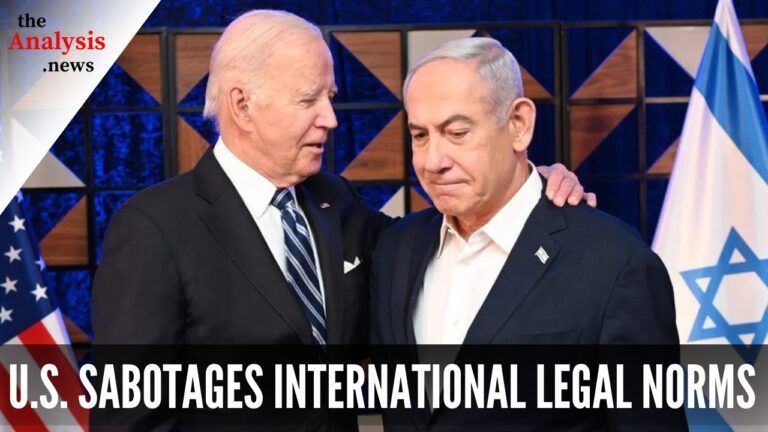A Second Pink Tide in Latin America? – Pt 2/2
With the left’s recent electoral successes in Peru and Bolivia, and previously in Mexico and Argentina, does this mean that there is a second so-called “Pink Tide” in Latin America? If so, how do we make sense of the first Pink Tide, its successes and failures, and what might Latin America’s left have learned from the first tide, as it gets ready to take power in several countries? René Rojas, professor at SUNY Binghamton, and Hilary Goodfriend, of Jacobin Magazine Latin America, argue that while the left needs a clearer economic plan, it is at an advantage at the moment because of the right’s disarray across the region.
TRANSCRIPT
Greg Wilpert
Welcome to theAnalysis.news. I’m Greg Wilpert.
This is part two of my conversation with Rene Rojas and Hilary, Goodfriend, about the state of neo-liberalism and the Left in Latin America. is an assistant professor of human development at the State University of New York, Binghamton. Hilary is a doctoral student in Latin American Studies at the National Autonomous University of Mexico and a contributing editor with Jacobin Magazine and Jacobin Latin America. Thanks again, both of you, for joining me again.
Hilary Goodfriend
Thanks, Greg.
Greg Wilpert
So, I want to continue with the question about what’s going on with the Right in Latin America, that is, the failures of the Left seem to have allowed… That is, [the failures] of the first pink tide, which we focused on last time, seemed to have allowed the right-wing and in some cases, the extreme Right, such as in Brazil and I guess you could include Colombia and almost in Peru and Bolivia, to return to power. Now, you could say that the Right tried to reverse the pink tide’s policies and to basically continue the neoliberal policies of the 1990s, that is, by opening up countries to transnational capital. But at the same time, they’re doing this with a kind of right-wing nationalist rhetoric.
Now, my question is now, first of all, whether you agree with this characterization and how would you basically describe their strategy? Let’s start with you, Hilary since the last time we left off with Rene.
Hilary Goodfriend
Sure, yeah, I think we’re seeing a couple of different approaches. I think, on the one hand, there’s a right-wing strategy that, as you characterize, is using these sort of nationalistic tropes and even quasi-fascist or right-wing populist approaches to gain power through existing democratic forms. On the other hand, I think we’re seeing a totally anti-democratic, authoritarian right-wing resurgence as well. I think you can look at something like Honduras for a pretty clear picture of what that looks like, a regime that has really no popular base, no popular support whatsoever, and has been able to, sort of govern through the chaos so far without one.
So, I think that those are sort of two different strategies that we’re seeing, and in both cases, there’s sort of two different approaches, to the failures of the prior, more traditional oligarchic bourgeoisie, U.S.-backed, neoliberal rule. The lack of a more sort of coherent approach is a symptom of, the lack of a right-wing consensus and a consensus of capital as to how it’s going to resolve or respond to the current crisis. That’s where I’d start.
Greg Wilpert
What do you think, Rene? How would you assess this?
Rene Rojas
Yeah, I really agree with the way Hilary put it and I would key in on what she termed the lack of coherence. I think, that just as the region and societies throughout the region, as a whole, are in crisis, and just as the Left throughout can be said to be in crisis. I think the Right is in crisis as well. They mostly, I mean, there are some exceptions, the elites have not figured out a way to vie for power, a viable way. So, I think that’s mostly what’s going on and that helps us understand possibly a somewhat different way of approaching it.
Many talk about a neo-authoritarian kind of wave as pushing back against the wave of pink tide reformers. I think that’s kind of overstated. There’s much more variation going on and a lot of it has to do with what Hilary mentioned, they’re trying different things and not much is working. Two good examples are what’s happening in Chile, for instance, where the old regime has just crumbled or is crumbling as we speak and that means that the old Right, the center-right has to reinvent itself to remain relevant.
Something similar is going on, for instance, in Mexico, I think Hilary probably be able to speak to this far more than than I would, but even with all of the failures of AMLO’s [president Andres Manuel Lopez Obrador] first years in office, the elite opposition has not been able to really do much with his shortcomings and they’re still trying to search for viable ways of articulating a right-wing program but fortunately for us, for the masses, and working people throughout the region, that means, that the Right and the neo-authoritarian Right is perhaps less of a threat, than many thought it would be at this point.
Greg Wilpert
But don’t you think, I mean, there’s a typical kind of situation, it seems, where, you have the reintroduction of neoliberalism on the one hand, which, in the north and the developed world is actually being declared kind of dead or being passé because of the coronavirus pandemic and the idea that neoliberalism is kind of ideologically bankrupt, but that’s being implemented, it seems, in these countries.
At the same time, as you’re mentioning, there’s this, imposition of an authoritarian regime, which is something that actually in Latin America has always gone together, neoliberalism with authoritarianism. So, basically what I want to point out to our question is, that even though in terms of a viable electoral strategy, it might be questionable, but just by virtue of the fact that it’s combined with this kind of repression, and that means essentially repression of the forces that are challenging neoliberalism and the Right, wouldn’t that still mean that it’s going to be viable in some sense, even if, not on a kind of typical political way, but on a violent basis? What do you think?
Hilary Goodfriend
Well, that’s the question, right? I think it’s pretty clear, that neoliberalism has lost its hegemony in terms of its legitimacy, in both the imperialist and central economies and in the periphery, but in the absence of an alternative hegemonic accumulation strategy, we’re seeing that the continuation and often deepening of some of those privatizations, deregulations, et cetera.
I think that’s the question, to what extent and how sustainable is it for capital to continue to just impose these policies and this strategy by force, especially in a context of economic crisis? I think the anti-democratic imposition of neoliberal economic development models is one thing in a more favorable, climate for accumulation and it’s quite another today.
Greg Wilpert
Rene, do you have anything to add to that?
Rene Rojas
Yeah, again, I think we’re largely in agreement. Neoliberalism is being reproduced now throughout the region, not by a resurgent Right, but really because no force has been able to step up and kind of take charge in all these crises. So, it’s kind of through inertia that neoliberalism is continuing, I would say. That’s an oversimplification, but a lot of that’s going on.
Take, for instance, the case of Peru, it really illustrates everything we’re talking about. Utter incoherence and fragmentation among elites and the Right and the reason that [Pedro] Castillo and the Left won was because elites wouldn’t get behind Keiko Fujimori.
So, they don’t really have a strategy, to rule, as a ruling class Right now, in political terms, but at the same time, on the other side of the ledger, the Left and popular forces have not been able to come together with a strong enough proposal for governing that would really threaten elite interests and cause it to somehow push back and fight back and impose an even harsher neoliberal model. I think that’s one of the reasons perhaps that a neo authoritarian kind of resurgence might not yet, be too much of a threat and it’s largely because I think the Left isn’t much of a threat yet, even though it has had some breakthroughs.
So far as the Left and popular forces are not posing a direct challenge to neoliberalism, I don’t see the Right now having to resort, broadly speaking throughout the region, to a coercive- military-authoritarian strategy.
Greg Wilpert
That’s actually what I wanted to turn to next which is exactly what the most recent developments are on the Left in Latin America and here I’m thinking particularly of the three most recent elections — those are in Ecuador, Bolivia, and in Peru. They all have something in common, that obviously, they were runoff elections against a very extreme Right, I mean, there’s one in Bolivia, was a little bit more mixed, but it was an extreme Right in the sense that they were also opposing the coup that had happened just — or the coup government, really — but what they also had in common was that they were really the underdogs in those situations, I would say. In the sense that, all of the media were lined up against them in Ecuador, Bolivia, and Peru, it was very difficult for them to get their message out, really. Despite these incredible odds they, in the case of Ecuador, almost won the election that is with Andres Arauz coming very close, even though he had like everything against him, from what I could tell.
Then, of course, we know that in Peru, less than a half a percentage point difference to Keiko Fujimori and — okay, Luis Arce in Bolivia had a much more substantial margin but he was, like I said, campaigning against essentially a very — in the context in which there was a coup government, but they managed to get so close. I’m wondering if this signals maybe, first of all, is a second pink tide coming and if so, what would their chances of success be? What do you think? Do you think, first of all, looking at kind of a little bit more into the future and also considering the electoral successes in Argentina and Mexico before that, does it make sense to talk about a second pink tide? Let’s start with you again, Hilary.
Hilary Goodfriend
I’m not sure if what we’re seeing is necessarily a second pink tide, I don’t know that I’d quite characterize it that way. I think there might be at least two tendencies. One is a sort of restoration of the first pink tide and I think that’s what we can see in Bolivia, for example, and in Argentina. On the other hand, I think that there is a new sort of Left, project potentially or a newer expression and different expression of the Left project, in the mobilizations and the processes that we’ve seen in Chile, for example, and potentially in Peru but I’m not quite sure yet.
I say that because I think there’s, a way in which there’s, a sort of danger in the restoration of that first pink tide project and that it can sort of tend towards almost a conservative, approach. You’re sort of appealing to the recuperation and maintenance of gains made rather than potentially, broader structural advances and that’s a danger in the restoration but it’s not guaranteed by any means.
Whereas I think that there’s a little bit more innovation in this constituent process, for example, that we’re seeing in Chile, that could really provide, if not a model, at least a lot of inspiration and lessons for the rest of the region.
Greg Wilpert
What do you mean by innovation? In what sense?
Hilary Goodfriend
Well, I think that the way in which — sort of like rethinking the state and popular participation is being carried out, it seems to have a sort of different energy and like I said, a different orientation than just the recuperation of a past administration.
Greg Wilpert
Rene?
Rene Rojas
Once again, I mean, what Hilary said, I think she’s spot on. There are, at least two, different kinds of paths, that we’re seeing now for the Left in Latin America and I think restoration is a very good term for what’s happening in the former, well that first pink tide wave.
In our last conversation, I described, something akin to like an equilibrium, very contested, but in these countries, particularly in Bolivia and Argentina. Venezuela’s just, I think, a case, apart right now, on its own, because of all the difficulties. But where the Right was not able to undo the reforms of the Kirshner’s, of Morales and the MAS [Movement for Socialism]. So, there’s a tug and a pulling back and forth, but both [Bolivian President] Arce and [Argentine President] Fernandes, come back a little more moderate than their predecessors. Restore the old kind of pink tide order, with some concessions and manage this kind of a balance, I think. It’s not at all the case in, for instance, in Peru, and in Chile, but yet again, there are huge differences between those two cases as well. I don’t think they should be grouped together either.
Hilary, is correct in my view, that there’s more room for innovation, there’s room for kind of changes and reforms that we haven’t seen in a while. The Chilean case comes after a 10-year cycle of protest and organizing and of, collapsing post-authoritarian order — that built up new forces, primarily that the Frente Amplio, I would say, and new social movements that have been able to coalesce now in the constituent assembly with the old Communist Party into a Left bloc.
Peru experienced nothing but disintegration over the past 30 years since Fujimori was in office, in the early 90s, I would say. So Castillo wins, but only because all other forces, all other rival parties, and movements have just crumbled and he barely ekes out a victory and he doesn’t have much behind him, in terms of broad social mobilization and organization. So, it’s going to be much tougher in Peru, I would say.
Greg Wilpert
Yeah, I think definitely the Chilean situation is really kind of exceptional in some ways because it seems like one of the very few cases where there’s a kind of grassroots movement. I mean, I don’t know. I’m not an expert on Chile, but it’s just my impression from the distance and without a very strong leader ahead of it. Just to make the comparison quickly to Venezuela, because there you also had grassroots movements of sorts, but they were all brought together under a very kind of strong leadership of Hugo Chavez, who then also pursued a constituent reform process, a constituent rewriting the Constitution, rethinking the role of the state, things that you mentioned, introducing participatory democracy, and so on but it was a very different approach or strategy, let’s say. Whereas, the Chilean one seems to be quite different from everything else we’ve seen. I mean, if you make the comparison also to Bolivia with Evo Morales, I just want to see if — Rene, since Chile is your home country, as far as I understand, if you would agree with that, that this is really kind of an exceptional process there.
Rene Rojas
Yeah, I definitely agree. And once again, this is what Hilary was getting at when she was talking about an innovative, exceptional case. Absolutely and it’s still wide open, anything can happen but there are some similarities nonetheless with the Venezuelan case. The main one, I think, is that what came to be known as the kind of the Concertación order or regime, what I call post-authoritarian neoliberalism in Chile, you know, that reigned for 30 years. There was this sharing of power between the center-right and center-left that I think is broadly reminiscent of the Puntofijo system in Venezuela, where you have these two main blocs sharing party. One is dominant, or the other, and it quickly disintegrates. I think that something similar happened in Chile.
One of the differences is that the sustained protest movement and mobilization in Chile — I should say, in Venezuela, largely occurred after the disintegration of the old system, after [Hugo] Chavez comes to power, with one series of challenges by the Right and by elites after another, that really serves to activate what came to be the Chavez base and ended up with this unified, or somewhat unified, mass movement funneled into Chavismo, eventually into the PSUV [United Socialist Party of Venezuela].
In Chile, you have that mass mobilization that is actually bringing down the old order, yet it remains quite fragmented, as you described, Greg. There are certainly positive signs which we can get into later and Right now, the constituent assembly is the convention, as it’s being called — it’s actually an assembly more accurately, it is the arena in which these kinds of realignments and reconfigurations are taking place.
Greg Wilpert
Yeah, we’ll definitely have to watch that. It’s very interesting and also with the new president of that assembly, it’s a very unusual thing to happen but I want to move on to the question of what you think are the lessons that the Left in Latin America has or should be learning at this moment in time? I mean — and maybe what this might mean for the Left also more generally around the world, but specifically drawing on the experiences in Latin America. So, what do you think, Hilary, and what can the Left learn from what’s happened so far, and what does it need to learn going forward?
Hilary Goodfriend
We touched on this a little bit in our earlier conversation but I also think that the lessons vary a lot depending on the cases that we’re looking at. For example, the role of the Armed Forces and the coup in Bolivia should — raises a lot of questions about the kinds of institutional reforms necessary, when the Left takes power.
As Rene mentioned earlier, obviously, the question of dependence on commodity rents is really crucial in terms of what happens, how do those rents get reinvested, and when that’s possible. It’s a lesson that I’m not sure is being learned evenly, certainly, in the case of Mexico, I think there’s a lot of concerns that the push to restore Pemex and recover the national oil production, it’s not necessarily being done in a way, that it’s going to eventually extract the country from the dependent position that it’s in. But I do think, that we’re seeing Right now in, for example, the Chilean case, a lot of the lessons from the first pink tide being applied in a new context, which is why, I wouldn’t suggest that Chile represents necessarily a rupture, from the previous processes, though I agree that it is pretty exceptional but I think, the way in which, the sort of plurinational approach and considerations of popular participation in the refoundation of the state, l think that’s inherited from these prior processes and that’s exciting to see.
Greg Wilpert
What do you think Rene?
Rene Rojas
Yeah, again, those are important lessons. I do think that the Left generally, has absorbed and has really assimilated the basic lesson that was the core of your book, Gregory. The Left has to challenge for power and has to challenge the state. It’s insufficient, but it’s a necessary part of the strategy and I think throughout, largely, thanks in part to what was learned in the Venezuelan case and other similar cases, which you highlighted in your book — the Left has really learned that you have to challenge elites at the level of the central state and fight for state power.
Of course, that’s not sufficient, along with that, I think you do need forms of disruptive mass mobilization, which will back the Left in positions of power, in the state once it confronts resistance from business elites and the military perhaps. I’m far more optimistic about the potential role of the military but, you know, Chileans have been wrong in the past about this so.
Greg Wilpert
What do you mean by that? I’m not sure.
Rene Rojas
I’m referring to the [Salvador] Allende experience where the popular unity, at least sectors, and within it primarily the communist and Allendes factions and socialists, were fairly confident that they can manage the military and the military wouldn’t intervene. So, it was just a reference to our dark past but, going back to what I was saying, I think the Left has also learned the lesson that you do need continued pressure from below disruptive mobilization, to really show elites that if they try to resist, that if they try to roll back reforms, the cost that they’ll face will be steeper because of the disruptions on the streets, in work-sites, in neighborhoods, et cetera.
Another important lesson, I think that the Left needs to learn, and this is where, I’m keeping a keen eye on what happens in the constituent assembly in Chile, is that the Left has to be a socialist Left. We’re not going to fight for all-out socialism but it has to be a radical Left that really does redistribute power and really does redistribute resources and income throughout society. Because in the absence of that you can get another war scenario, I think, quite easily and I think a war scenario is a manifestation of popular disillusion with Lula and the PT [Partido dos Trabalhadores] and so we have to be watchful of that possibility. The best way to do that is to really push for radical reforms, for nonperformance reforms, as some of us used to call them.
Greg Wilpert
I’m probably going to make a lot of enemies from the next thing I’m going to say, but your parallel between PT and Bolsonaro reminds me of the parallel that many people in the U.S. draw between the Obama presidency and Trump’s election, which isn’t to say that Obama was like Lula, but there are certainly parallels.
So, yeah, I mean, you guys, I think it’s very interesting. So, we’ve kind of identified, I guess, three or four different areas that the Left has or needs to learn. One is the role of the military and I guess you could add the role of the police as well because they played an important role in the Bolivian coup and then, of course, there’s, the importance of having social movements and the constant organizing going on. Some countries have learned this lesson. In Venezuela that was the case, compared to Ecuador, where I think Rafael Correa was not able to organize a social base, which is why I think they lost. Then, of course, the economic strategy and that’s also very interesting how Alvaro Garcia Linera, the [former] vice president of Bolivia, had emphasized the importance of an economic strategy. That was one of the reasons Bolivia was relatively successful, in a sense more successful than Venezuela, at least economically, although you can argue about whether it was radical enough.
The other thing, though, that I want to ask about, that might be missing in the lessons, is perhaps, paying attention to the role of the United States. I’m wondering, I mean, especially now in a situation where the U.S. has turned towards — I mean the U.S. has always been the main force in Latin America for trying to undermine the Left or progressive movements and I think everybody knows that. But I’m wondering, to what extent has the Left ever really had a strategy for dealing with the U.S.? I have the feeling it’s always an afterthought, that in other words, you know, we’ll deal with it when it comes, so to speak, rather than trying to develop a strategy beforehand to deal with the efforts of the U.S. to undermine these countries. And then, of course, once that happens, it might be too late. So what do you think? Hilary, you want to start or?
Hilary Goodfriend
Sure, yeah, I agree. I think it’s really difficult to talk about these processes without putting them in that context and I guess I think that it’s impossible to divorce a political response to the U.S. empire from the economic strategies that we’ve already been talking about. That’s especially true the farther north you go in the region. So for Central America and Mexico and the Caribbean, these are economies that are completely bound up in a totally asymmetrical but very integrated relationship with the U.S. economy.
In that sense, I think that the projects for regional integration are really important, especially for these smaller economies, who just alone, there’s no way that they could ever have the kind of productive capacity that Rene has suggested is so important, to get themselves the kind of political room to make sovereign policy decisions.
History has shown that the U.S. will intervene again and again to subordinate efforts to and towards that kind of more autonomous regional integration to the needs of U.S. capital.
So, I think, that’s really critical. I suggested in our earlier conversation that, the sort of collapse of the ALBA [Bolvarian Alliance for the Peoples of Our America] bloc, but also, the other diplomatic regional projects in South America was really devastating for this sort of incipient Left projects in Central America and I think it’s impossible to imagine that kind of project ever being successful without the kind of backup from a stronger regional stance.
Rene Rojas
Yeah, absolutely, I mean, the Chilean case under Allende, really underscores the importance of having allies and trading partners, regionally and beyond, and that kind of solidarity, even if it’s not on a moral basis, on a pragmatic basis, is absolutely crucial. Along with that, this might sound somewhat counterintuitive, but I think, I’ll put it this way, the best defense, it’s not always going to work, but the best possible defense against foreign outside meddling, incursions, and assaults are actually domestic.
As powerful as the U.S. is in the region, it can’t always get what it wants. Most recently, in Venezuela, you have a society that’s really falling apart. It’s a terrible economic and social crisis and the U.S. tried to impose [parallel president Juan] Guaidó as an alternative and it just failed miserably. Why? It’s because I think domestic circumstances in Venezuela, as bad as they are, don’t allow for a U.S.-supported opposition to take power Right now. It’s almost by default because there are just no good options in many respects.
If you look back at the Chilean case, which is once again, crucial in terms of this lesson under Allende, the U.S. tried very hard to, first of all, prevent him from taking power.
Then in the early days of his presidency, causing a crisis in the militaries of the military take over and it failed really badly. The reason it failed was that domestically, Allende and his coalition were at their strongest point and Chilean elites were very divided and at one of their weakest points, in many ways. It wasn’t until that equation, that configuration, the domestic configuration changed and the Allende coalition starts to fracture and elites reunify the center and the Right come back together to oppose Allende, and that the U.S.-supported coup was successful.
I would maintain that happened, that the U.S. strategy in Chile was successful because of what was happening internally, because of what was happening domestically. Now, again, I don’t think it’s foolproof. I don’t think if the U.S. really deploys all of its might and there is little that you can do, but rarely can the U.S. deploy all of its might against our countries.
There are many constraints that Washington and the foreign policy establishment face when carrying out operations and its policies in the U.S. and so absolutely, I think the regional perspective is critical but the domestic reality is also decisive in many ways.
Greg Wilpert
OK, well, on that note, I think I’ve covered a lot. I think we’re going to have to leave it there but it was really an excellent conversation. I’m glad to have had you guys on and maybe we can do something like this again sometime. I was speaking to Rene Rojas, assistant professor of human development at the State University of New York, Binghamton, and Hilary Goodfriend, a doctoral candidate at Mexico’s UNAM University and contributing editor at Jacobin Magazine.
Greg Wilpert
Thanks again, Rene and Hilary, for having joined me today.
Hilary Goodfriend
Thank you so much to both of you. It’s a pleasure.
Rene Rojas
Likewise. I really had a lot of fun.
Greg Wilpert
And thanks to our viewers and listeners for joining theAnalysis.news, please don’t forget to subscribe to our YouTube channel and to donate something at theAnalysis.news website so we can continue our programming such as this. Thanks again and see you soon.
END
Podcast: Play in new window | Download






